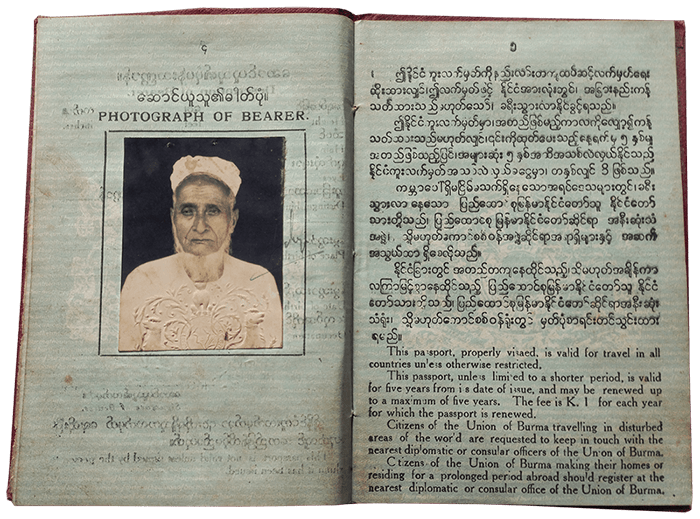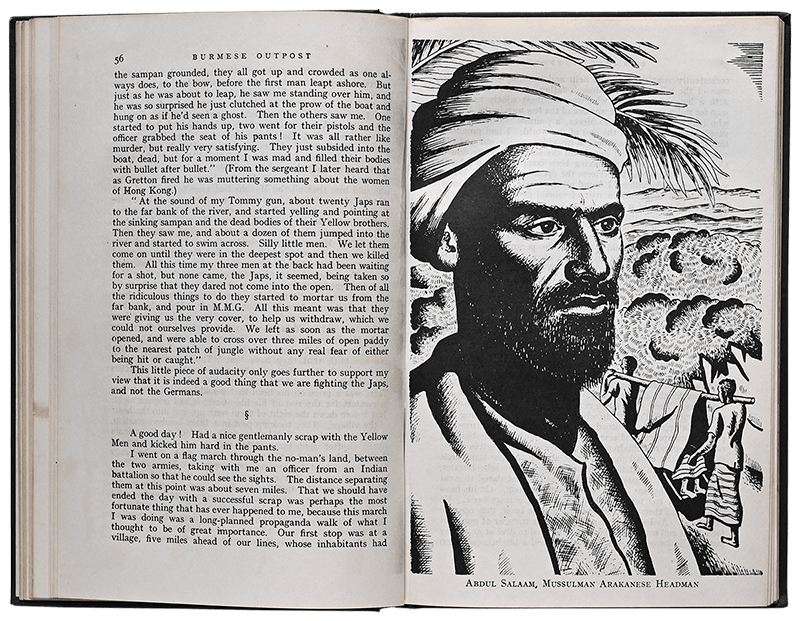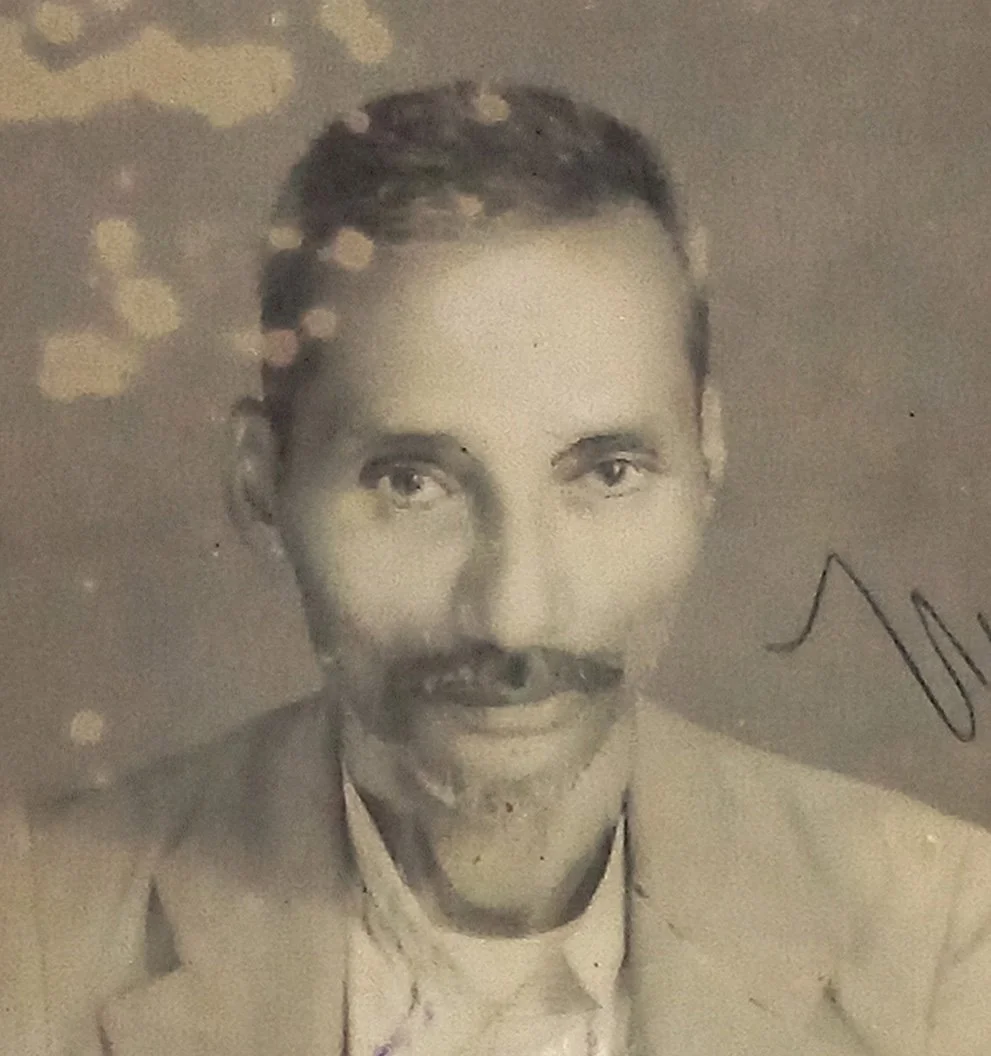
3
The Forgotten
Contributions to war efforts against the Japanese in Arakan during WWII.
“I had no weapon either to attack or defend. Shots passed right and left of me, a hand-bomb missed me narrowly and what appeared to be a mortar-shell just passed heating my cheeks.”
Zain Uddin,
Asst. Liaison Officer, “V” Force
April 25, 1943
After the Japanese invaded Burma in late 1941, the Arakan region became divided. Communities that had co-existed alongside one another took different sides in the war. The Rohingya (referred to as Arakanese Muslims/Musalmans in British correspondence at that time) served on behalf of the British; Arakanese Buddhists (today’s Rakhine community), along with Burmese nationalists, mostly took the side of Japan.
In April 1942, the British Army established the “V” Force guerrilla unit in Arakan to help defend India against the advancing Japanese army. “V” Force consisted of ‘British officers who relied on local inhabitants as intelligence agents.’ These local inhabitants worked behind Japanese enemy lines and provided intelligence to the British about Japanese troop positions and movements. In some situations, they fought in raids and ambushes.
In Arakan, men from the Rohingya community served as scouts and agents for “V” Force. Members of communities like the Chin, Naga, Lushai and Khumi also collaborated with the British in Arakan. Elsewhere in Burma, the Karen, Karenni and Kachin communities fought with the British. Arakan was the first major defeat of the Japanese in Burma.

Headlines and articles from The Hindustan Times and The Statesman from Dec. 1941 - May 1942 along with a collection of news clippings from the personal papers of Lt. Gen. Noel M.S. Irwin. He served for the British Army in Arakan 1941-early 1943.
British Library: Hindustan Times - SM27
The Statesman (Calcutta) MC1132
“The enemy was actively preparing for an offensive,” Zain Uddin, a Rohingya and an Asst. Liaison Officer with “V” Force wrote on April 25, 1943. He described a recent Japanese advance in the area of Kyauktaw in Arakan. “Every common man knew what the enemy was doing and shivered at the thought of Arakanese [Buddhist] supremacy again.” His account of the events were included in a confidential report to senior British military officers.
Zain Uddin was born near to Kyauktaw in central Arakan. His role in ”V” Force was to assign local Rohingya men from Kyauktaw to serve as guides for British patrols. As the Japanese advanced, Zain Uddin and other Rohingya in “V” Force knew the British troops would retreat from Kyauktaw. Doing so would be catastrophic.
The prior year, in early 1942, the British retreated to the safety of British India following Japan's initial advancement into Arakan. A power vacuum was created in Arakan. Communal tensions, sharpened by the wartime divide, turned the Buddhist and Muslim communities in Arakan against one another. Buddhists killed Muslims. Muslims killed Buddhists. Tens of thousands from both communities were massacred.
By late 1942, British forces had reoccupied parts of Arakan. With the British holding Kyauktaw again, Zain Uddin and the Rohingya community had hoped the British would restore law and order. “The arrival of British troops did not improve the conditions,” he wrote.
In early 1943, the Japanese began another offensive. The British prepared to retreat for a second time. Zain Uddin feared the worst. Those left behind would again be defenseless against the Arakanese Buddhist community.
“On behalf of the ex-soldiers of the “V” Force, I pleaded to either allow them to evacuate with the troops…or to give them some weapons so as to enable them to defend their lives against the attack of the merciless foe.”
Zain Uddin
Asst. Liaison Officer, “V” Force
April 25, 1943
Personal photo album of Capt. Anthony Irwin, who served for “V” Force in North Arakan. These pages show the 26th Indian Division Headquarters in Bawli Bazar, Maungdaw, North Arakan in 1943 and an ‘observer’ watching British mortor fire in 1944.
Before World War II, Zain Uddin had been a university student and principal. At the time of his birth, Burma was part of British India. He attended university in Calcutta and returned home after finishing. Anti-British solidarity ran high among Burma’s educated youth. In 1920, he joined in the nationwide boycott of the British colonial education system. He helped create the National High School in Akyab (today Sittwe), which was one of the earliest ‘private’ schools and prioritized a Burmese curriculum. The school opened in 1921. Buddhist and Muslim students attended for the next 20 years. He was the school’s second principal. During Japanese occupation, the school became a supply garrison. Only by defeating the Japanese could Zain Uddin return to his teaching. In “V” Force, he and other Rohingya could help make this happen, yet in early 1943, as the Japanese advanced again on Kyauktaw, Japanese defeat seemed unlikely.
Zain Uddin’s request to his superiors was refused.
“As we passed an Arakanese village...we were received by a shower of bullets from the jungle. To make matters worse, a batch of Japanese, about 30 in number made their appearance through the village.”
“At the sight of these, our troops began to run as no deer had ever run when chased by a tiger,” he described of the retreating British Indian Army soldiers. He fell to the ground twice and crawled ahead during the Japanese attack, stopping now and then to pick up any rifle and ammunition he could find. He possessed an important map.
“I was carrying a map...Fearing that it might fall into enemy hands, I tore it into pieces and scattered the pieces in the wind as I advanced.”
Zain Uddin escaped from Kyauktaw. Extracts from his report on April 25, 1943 were delivered to British India Army General Headquarters in New Delhi in May 1943. After this second British retreat from Kyuaktaw in 1943, another massacre occurred. An unknown number of Rohingya Muslims died. The same year, allied bombing destroyed the National High School in Akyab.

“Now, I have concluded my essay and expressed my humble opinion. Let me then conclude with the sincere prayer, May the Almighty God grant us a speedy victory and once more restore peace to the human race.”
Rohingya, "V" Force
April 25, 1943
Boli Bazar, Arakan
Burma
Unkonwn

News had also been received of the communal tension that prevailed and of such incidents as, for instance, the massacre of Muslims that had occurred at Kyauktaw in June 1942
All traces of Buddhism in Buthidaung Subdivision have been eradicated. Pagodas and Pongyi Kyaungs have been razed to the ground.
British guerillas are all Muslims and Arakanese country is therefore regarded as hostile territory.
It is agreed now that for some time to come races must be kept segregated,
Political situation is thus serious. Feeling runs extremely high and violence has held sway unchecked for some time so that Musalmans and Buddhists have entirely lost confidence in one another.
There seems little doubt, however that trouble really began in South Arakan where the Buddhists attacked the Musalmans
…another lot of them around the mouth of the PI Chaung were slaughtered after we evacuated in 1943!
I would mention here that throughout our stay in N Arakan (ie from August 1942 to the end of the Japanese war) the allegiance of the Muslims never wavered
British Library: IOR R/8/9, Mss Eur F/180/38
Background - MSS Eur E/215/68

Personal papers, diaries and photo albums of Capt. Anthony S. Irwin and his father, Lt. Gen. Noel M.S. Irwin. Both served for the British Army in Arakan during WWII.
1943-44
In early April 1943, 24-year-old Captain Anthony S. Irwin arrived in Arakan. He had already served for the British in France and in Dakar. In 1943, he and a small group of British officers developed a network of trusted local operatives for “V” Force in Arakan. In North Arakan, Irwin worked primarily with the Rohingya community.
Irwin was based with “V” Force at guerrilla headquarters in Taung Bazar, Buthidaung. The network of Rohingya operatives and scouts included farmers, village Headmen, former police officers, government clerks, headmasters and teachers. Irwin had much respect for members of the Rohingya community. This respect was reflected in his diaries and later in his book, Burmese Outpost. The book was published in early 1945. It is one of only a few first hand accounts of the war in North Arakan during WWII and the contributions the Rohingya community made to British war efforts against the Japanese.
A diary and two of Irwin’s ‘Field Service’ books from 1943 during his time in Arakan.
“They do not stand up with guns or rifles but with loyalty and courage. Every day a dozen men will go into enemy lines, work ...and return in a week or so with information. Some do not come back...Can such loyalty and courage be forgotten?”
Captain Anthony S. Irwin
Personal diary entry, Nov. 23, 1943
Referring to Rohingya operatives in Arakan
One of Irwin’s ‘Field Service’ books from 1943 during his time in Arakan. This page shows a draft of an announcement from October 1943. It was intended to recruit local villagers into “V” Force and inform them of upcoming British attacks against the Japanese.
Personal photo album of Capt. Anthony Irwin labeled: ARAKAN 1943. Irwin (left) stands with a group of Rohingya, aka M/A Mussulman Arakanese, scouts at “V” Force guerrilla headquarters in Taung Bazar, Buthidaung, Arakan (1943). Included is Irwin’s handwritten remark on the back of the photograph.

Over several pages in one of his ‘Field Service’ books, Irwin lists the names of Rohingya leaders who worked for “V” Force in late 1943. Found during the course of the project Ek Khaale are the original passports and National Registration Card of three men listed in this ‘Field Service’ book: U Hla Meah (top), Abdul Salam (middle) and Amir Hamza (bottom) - who is listed on the next page of the ‘Field Service’ book.
Local boats (sampans) on the Pruma Chaung River at Bawli Bazar, Maungdaw in 1943. Bawli Bazar was the primary base for the British Army and “V” Force in Arakan.

Article about the Arakan Campaign published in The Sphere Magazine (UK). The Maungdaw-Buthidaung tunnel still exists today. British and Indian troops navigating the Kaladan River in early 1945.
The Sphere - Nov 1, 1943, Nov 18, 1944
An article in The Sphere Magazine about the British defeat of the Japanese in Arakan in 1944.
In late February 1944, British forces defeated the Japanese in the Battle of Ngakyedauk Pass or ‘Admin Box’. The battle took place in Maungdaw and Buthidaung in North Arakan. It was the first major defeat of the Japanese in Burma. Some historians say the defeat was a turning point in the war in Southeast Asia.

To the officers and men of the "V" Force I send my congratulations. The fourteenth Army has inflicted on the Japanese the greatest defeat this Army has as yet suffered...
August 31, 1944
Lt. General William J. Slim was commander of the British 14th Army. Slim wrote a letter to “V” Force praising their efforts for the defeat of the Japanese in Arakan.

Irwin’s book, Burmese Outpost, was published in 1945. The book chronicles his time with “V” Force in North Arakan from 1943-1944. The book is organized into three chapters. The first chapter focuses specifically on his time working with the Rohingya (Mussalman Arakanese) community. He praises their contributions to the war efforts against the Japanese.
“They have had to put up with two British withdrawls, and yet they have come back with us and fought, and died with and for us. I sometimes wonder if any other people in like circumstances can tell the same story of loyalty and patience as can these Mussulman Arakanese...Without these people we would have been blind and deaf. With them we have eyes and ears...”
Capt. Anthony Irwin
Burmese Outpost, p.22, 25

Photo - Unknown/The Listener
In early 1945, Irwin was back home in Britain. On March 6, 1945, he read the essay, Eyes of the 14th Army, for the popular BBC radio program, Window on the World. He talked about the importance of the Rohingya community and “V” Force. When it was broadcast, 4.5 million people heard it.
A transcript was published in The Listener magazine on April 5, 1945 including a rare photograph of ‘Mussulman Arakanese’ (Rohingya) scouts being trained to use old, WWI issued rifles and swords.

On June 14, 1945, the British government awarded War Service Certificates to seven Rohingya from Arakan. The awards were formally announced in the Burma Gazette. One of the men was Abdul Salaam, a Headman from Buthidaung. He is also mentioned in Burmese Outpost and included in one of Irwin’s ‘Field Service’ books. Here: the original copy of his War Service Certificate and his Burmese passport issued in 1949. On June 26, 1945, the British awarded British Empire Medals to two more Rohingya from Arakan (below). The Japanese surrendered to the British in Rangoon on August 28, 1945.Japan surrendered to the on August 28, 1945.

IOR/V/11/3877-8





























